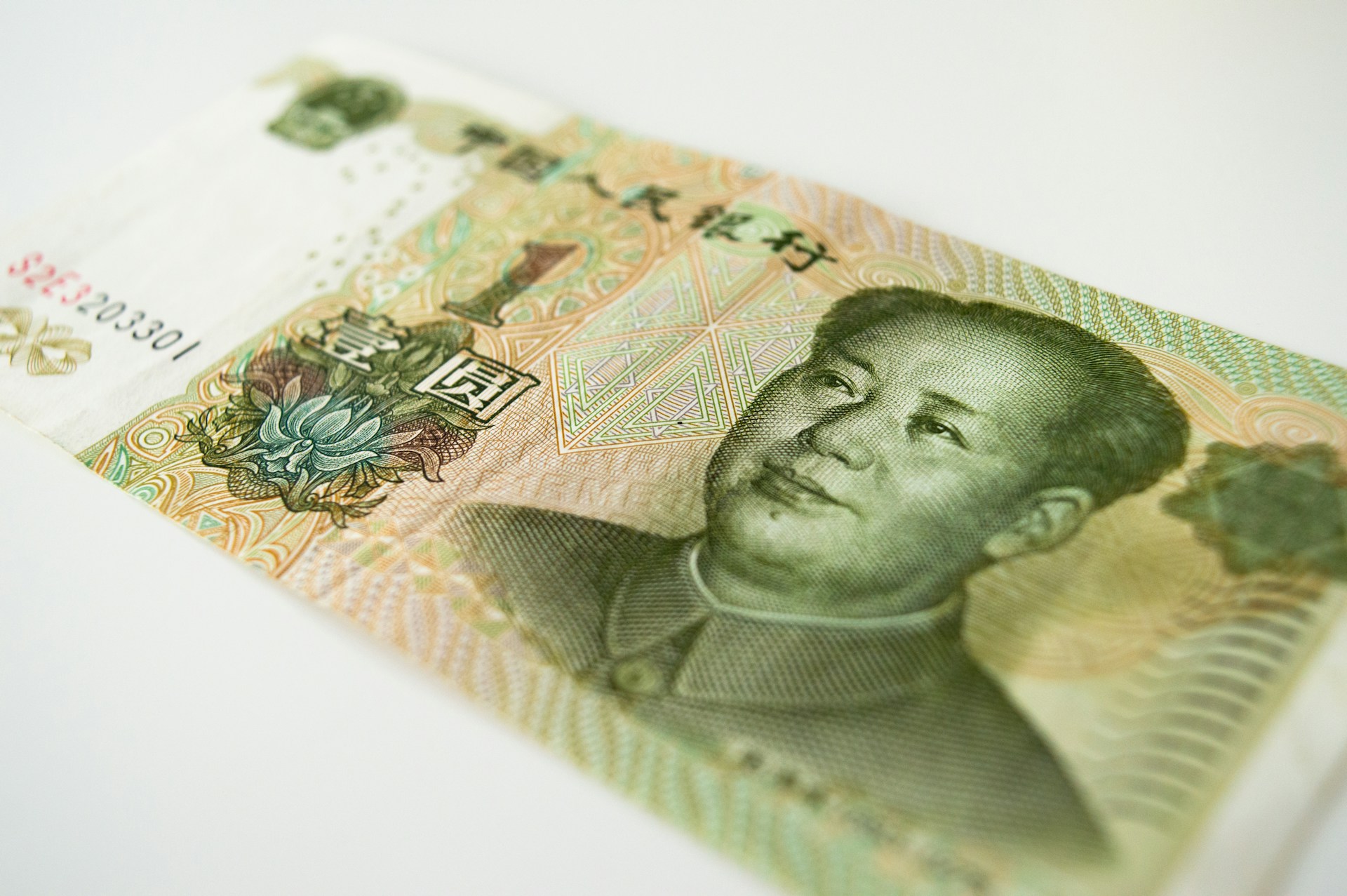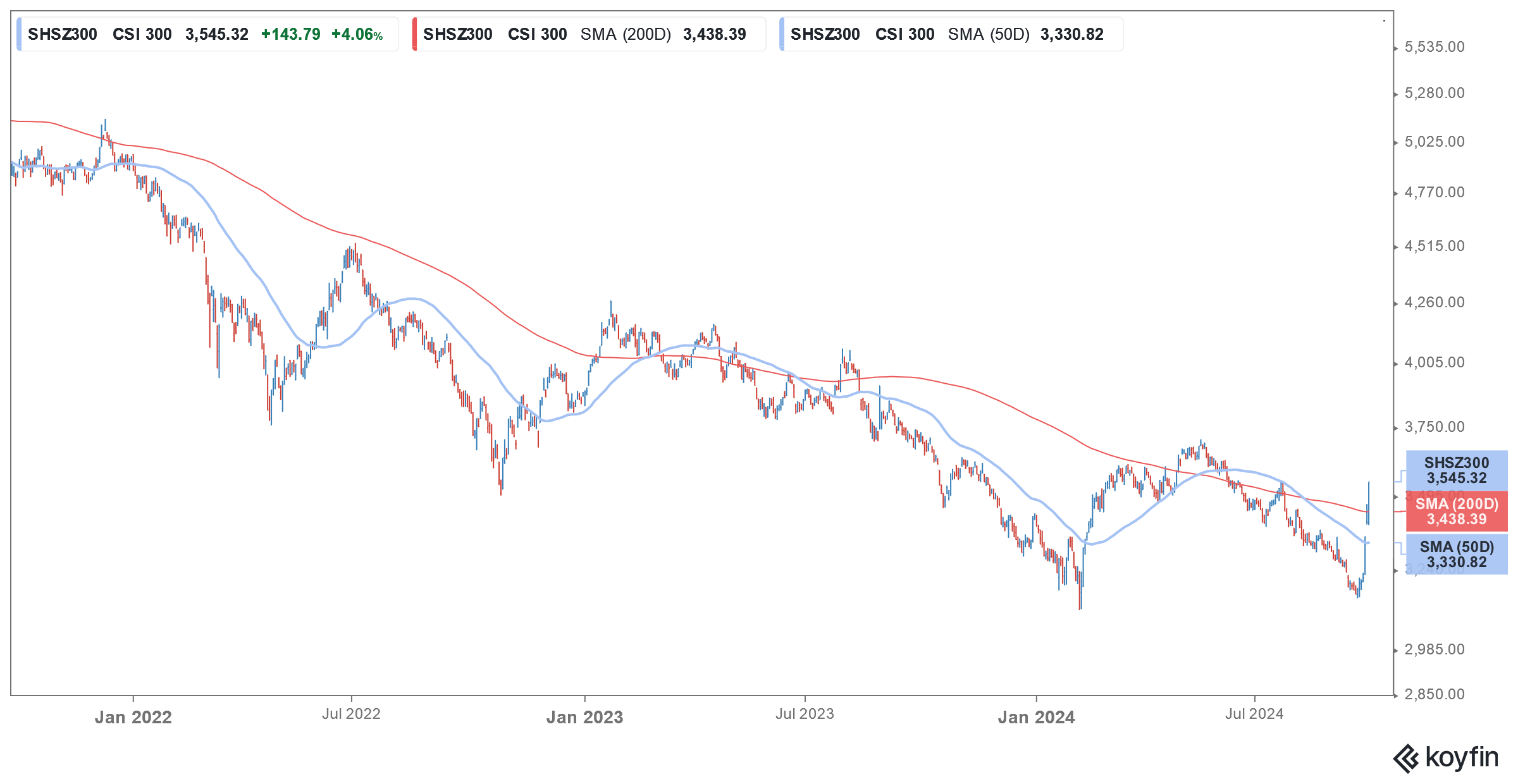
Chinese shares, which were underperforming global markets by a wide margin this year, rebounded this week and had their best weekly performance since 2008 amid optimism over the much-awaited stimulus.
Both the mainland’s CSI 300 and Hong Kong’s Hang Seng Index delivered double-digit returns this week and the latter had the best week since 1998. Notably, Chinese shares have been out of favour with many global investors amid a structural slowdown and growing trade tensions with the West – especially the US.
For long, markets were expecting the world’s second-largest economy to announce stimulus to revive its economy. While the country did take many steps to support the economy, they were not enough to calm nerves. Notably, given China’s already precarious debt situation, the country finds its hands tied in reviving its sagging economy. However, this week, China announced both monetary and fiscal policy measures to arrest the worsening slowdown.
Chinese shares rise after a flurry of stimulus
The Chinese central bank lowered its 7-day reverse repurchase rate by 20 basis points to 1.5%. It also lowered the reserve requirement ratio for banks by 50 basis points which would make more funds available for lending.
The People’s Bank of China said that the reserve ratio cut will “create a good monetary and financial environment for China’s stable economic growth and high-quality development.” Governor Pan Gongsheng said that the PBOC would cut the RRR by between 25 basis points to 50 basis points by the end of 2024.
Notably, while the rest of the world was battling with multi-year high inflation, Chinese inflation was quite benign and the country was instead worried about deflation. Meanwhile, while Chinese shares rallied on the monetary policy support and analysts welcomed the move, most believed that the country would also need to provide fiscal support.
China is struggling to achieve the 5% GDP growth target
As China struggles to meet its 2024 GDP growth target of 5%, the country is looking at fiscal measures to revive the economy. According to a Reuters report, the country is looking to issue sovereign bonds worth around $284 billion to raise funds.
Specifically, the government is looking to support its ailing housing sector where sales have stagnated. The Communist Party politburo said, that officials “will respond to people’s concerns, adjust home purchase restriction policies, lower existing mortgage rates and improve land, fiscal, tax and financial policies as soon as possible to push forward the new model of property development.”
Chinese real estate shares jumped on the reports of the government providing a stimulus to the sector. Notably, in the past Chinese President Xi Jinping has spoken against speculation in the housing sector. He also clamped down on the tech sector but the government has since taken a much more conciliatory stance amid the worsening slowdown.
Analysts see the fiscal stimulus as a positive step for the Chinese economy.
Bruce Pang, the chief China economist at Jones Lang LaSalle, said the politburo’s backing of stimulus “represents a strategic shift in macro policy, from piecemeal policies to a highly orchestrated package in the right direction”.
He added: “A pickup in government spending will probably be sufficient to drive a turnaround in business confidence, market sentiment and economic activities, helping China to catch up with potential trend growth.”
China might need to do more to revive the economy
While Chinese shares jumped this week, many analysts are cautious about the Chinese economy. In his report, Ting Lu, chief China economist at Nomura said that while the “‘shock and awe’ strategy could be meant to jumpstart the markets and boost confidence,” China still needs to address the “deep-rooted problems” through well-thought-out policies.
He added, “If not designed well, a stimulus program in a haste, even if seemingly large, could have a slow and limited impact on growth.”
Paul Christopher, head of global investment strategy at Wells Fargo Investment Institute doubts the recent stimulus will move the needle for the Chinese economy. “China’s policy moves to lower interest rates have not helped improve confidence among consumers who are fearful of borrowing in the first place,” said Christopher.
He added, “We would be selling emerging market equities at this point,” “as we have little confidence in Beijing’s willingness to extend the large stimulus that is needed.”
Tepper bought Chinese shares after Fed rate cut
Meanwhile, billionaire investor David Tepper said that he bought Chinese shares after the Fed’s 50 basis point rate cut earlier this month.
“I thought that what the Fed did last week would lead to China easing, and I didn’t know that they were going to bring out the big guns like they did,” said Tepper. Among other fund managers, Michael Burry also doubled down on Chinese shares this year.
While Chinese shares are still uninvestable for many US investors after the country’s tech crackdown, many have warmed upto them due to their tepid valuations.
That said, China’s woes seem far from over, and data released today showed that the country’s industrial profits fell 17.8% in August which was the biggest decline in over a year.
The country’s industrial sector has been plagued by a massive overcapacity and with many countries clamping down on imports from China, Chinese companies are struggling to export their overcapacity.


Question & Answers (0)